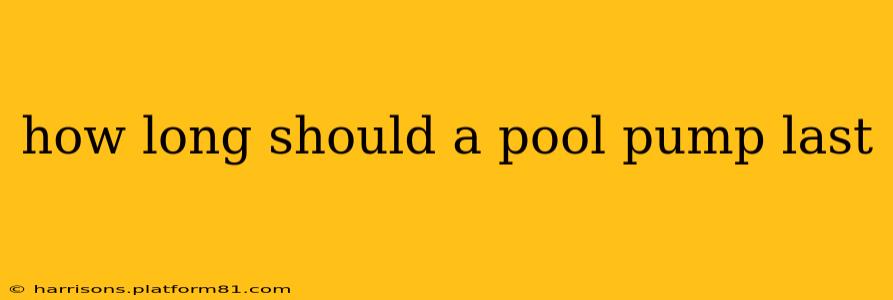Owning a pool is a rewarding experience, but maintaining it requires dedication and understanding of its various components. One of the most crucial elements is the pool pump, responsible for circulating water, keeping it clean, and ensuring optimal functionality of your filtration system. But how long can you expect your pool pump to keep chugging along? The answer isn't a simple number, but rather a range influenced by several factors. This comprehensive guide will explore the lifespan of pool pumps, the factors that affect it, and what you can do to maximize their longevity.
What is the average lifespan of a pool pump?
The average lifespan of a pool pump is between 8 and 15 years. However, this is just an average. Some pumps may last significantly longer, while others might fail much sooner. Several factors, which we'll discuss in detail below, contribute to this variability. Think of it like a car—some last longer with proper maintenance than others that suffer from neglect.
What factors affect the lifespan of a pool pump?
Several factors significantly impact the lifespan of your pool pump. Understanding these will help you both extend its life and make informed decisions when it's time for a replacement.
1. Pump Quality and Brand:
The initial quality of the pump plays a crucial role. Higher-end pumps, often from reputable brands, generally utilize superior materials and construction techniques, resulting in longer lifespans. Investing in a quality pump upfront can save you money in the long run.
2. Frequency of Use:
A pump running constantly will naturally wear out faster than one used intermittently. While continuous running ensures optimal water clarity, consider using a timer to reduce runtime when possible, especially during cooler months. Optimizing your filtration cycle is key to balancing clean water and pump longevity.
3. Proper Maintenance:
Regular maintenance is paramount. This includes cleaning the pump basket regularly to remove debris, inspecting the impeller for wear and tear, lubricating moving parts, and ensuring proper plumbing connections. Annual professional servicing is highly recommended.
4. Environmental Factors:
Exposure to harsh weather conditions, such as extreme heat or freezing temperatures, can negatively impact a pump's lifespan. Protecting the pump from direct sunlight and freezing temperatures, especially during winter months, can significantly extend its life.
5. Water Chemistry:
Poor water chemistry can lead to scaling and corrosion within the pump, damaging internal components. Maintaining proper pH levels and sanitizer levels is crucial for both the pump and overall pool health.
How can I extend the life of my pool pump?
Taking proactive steps can considerably lengthen your pump's lifespan. Here are some key practices:
- Regular Cleaning: Clean the pump basket at least once a week, and more frequently during heavy use.
- Inspect Impeller: Regularly check the impeller for wear and tear. Replace it as needed.
- Lubrication: Lubricate moving parts as recommended by the manufacturer.
- Winterization: Properly winterize the pump during colder months to prevent damage from freezing.
- Regular Servicing: Schedule annual professional inspections and servicing.
How do I know when it's time to replace my pool pump?
Several signs indicate it's time for a new pool pump:
- Frequent Overheating: If your pump is frequently overheating, it's a sign of a problem that needs attention.
- Unusual Noises: Loud grinding or humming sounds are often indicators of worn-out components.
- Reduced Flow: If the water flow is significantly reduced, it could be due to impeller wear or other internal issues.
- Leaks: Any leaks from the pump are serious and require immediate attention.
- Age: Even with proper maintenance, pumps eventually reach the end of their lifespan. Consider replacing an older pump (over 15 years) proactively.
What are the different types of pool pumps?
There are several types of pool pumps, each with its own characteristics:
- Single-speed pumps: These are the most basic type, running at a constant speed.
- Two-speed pumps: Offer more energy efficiency by allowing you to choose between high and low speeds.
- Variable-speed pumps: Provide the greatest energy savings and allow for precise control over flow rate.
By understanding the factors influencing pool pump longevity and adopting proper maintenance practices, you can significantly extend the life of your pump and save money in the long run. Remember, a well-maintained pump contributes to a clean, healthy, and enjoyable swimming experience.
